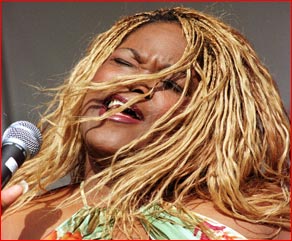
|
||
| Volume III, Issue III | Autumn 2004 | |
| Autumn 2004 Home Page |
| Culture/ Technology |
| Fiction |
| Music |
| Poetry |
| Theater |
| About / Contact |
| Archive |
| Current Home Page |
Shemekia Copeland carries the blues forward
Unlike most 20-somethings today, Shemekia Copeland grew up with blues on the stereo at home.
Of course, as the daughter of the late Texas bluesman, Johnny "Clyde" Copeland, Shemekia Copeland was going to be exposed to the blues. What she didn't know, at least at first, was that she would one day carry the blues forward to a new generation.
 While her father always encouraged her singing, Copeland said in an interview that when she was in high school she was planning to study to be a psychiatrist.
While her father always encouraged her singing, Copeland said in an interview that when she was in high school she was planning to study to be a psychiatrist.
"Never did I think that people would pay money to hear me do something I've been doing around the house since I was 3 years old," she said with a laugh. "I thought it was kind of crazy."
But when her father's health began slipping and he asked her to join him on tour, that all changed – even though she was just 16. For the next few years, until he passed from heart diseases, she toured as her father's opening act, sometimes joining him on stage - both learning the business and building up her own following that got hooked on her impassioned, full-throated blues shouting.
Today, she has three albums out (the first issued when she was only 19), a W.C. Handy award and a Grammy nominee under her belt, and a fourth album due out in the late spring. Despite her relative youth (she was born in 1979), Shemekia Copeland has become one of the top draws on the blues circuit – a situation more than a little ironic in that most blues fans are significantly older than she is.
Does she see many people her own age at her shows?
"Occasionally," she said. "And now some who are even younger. Of course, the biggest fan base is not 25 years old."
Would she like to have more people her own age listening to her music?
"Hell yeah, I'd like it, but people in hell would like ice cream sandwiches, too!" she said, explaining that, "Unfortunately, this music doesn't appeal to young people – it's not what they see on TV."
And Copeland is unlikely to ever perform the music popular with her generation. Of the popular hip hop and rap of her youth, she said, "Some of it was appealing, some of it was cool, but it wasn't my thing."
Besides, while her friends were sitting in a high school classroom, Shemekia was on the road with her father. While Copeland says she learned much from watching her father, she emphasized that he wasn't much for sitting down and imparting wisdom to his daughter.
"My father was very old school," she said. "If you want to learn, you have to just watch. They're not going to sit down and ABC everything for you. You just have to watch what's going on and take heed."
The one lesson she said her father did pass on to her directly was to never read the press.
"If you read the press you start to believe it – so I don't read it. If you read it and it's good, you become arrogant and cocky and impossible to deal with. And if you read it and it's bad, you become bitter and mad. So I don't allow myself to get into those types of situations."
While her father always supported and encouraged her singing, Copeland said her mother was more worried about her daughter being on the road.
"My mom was concerned. I'm her little girl on the road with all these crazy wolves," Copeland laughed. "Yeah, she's nervous, but she's always been supportive.
"The road is no place for a lady. But if you handle it well and do the right things, you'll be fine."
As for the relative lack of young people at her shows, Copeland says that doesn't really concern her too much in terms of having a future audience for the blues form she so loves.
"I don't think anybody has to worry about the future of the blues. It hasn't gone anywhere in all these years."
![]()
Autumn 2004 Music Section | Autumn 2004 Main Page
Current Music Section | Current Home Page
Copyright © Turbula.net